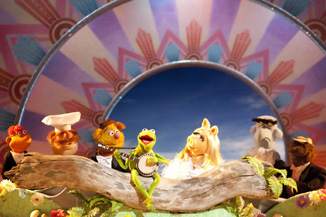|
|
2012 Calvin Awards: Best Use of MusicFebruary 14, 2012
In movies, music can be a character unto itself. That’s certainly true of last year’s winner in this category, The Social Network, and it is surely true for every single film that finds itself in our top ten.
Our fifth place film is Rango, which relies on a Greek chorus of mariachi owls to narrate a portion of the story, and they do so magnificently through song. Voiced (and instrumented - is instrumented a word?) by Los Lobos, as they foretell things that are to come, they consistently reiterate that our hero, Rango, will die (I'm not giving anything away to tell you this - they do it within the first minute of the movie). The music is perfection, highlighting a movie that is already highly unique and unafraid to take chances. Bravo, Rango! Hanna takes the sixth place spot for its soundtrack composed by the Chemical Brothers. Energetic and surprisingly stripped back for the duo, the electronica is an ideal accompaniment for a film that leaves the viewer unsettled and disconcerted. Midnight in Paris and Moneyball are tied for seventh place. Some of the music in Midnight in Paris is very Woody Allen - and if you're a fan of his films, you know what I mean - but it expands further than that as Gil goes back to 1920s Paris. Time-appropriate tunes from the likes of Cole Porter, Django Reinhardt, Josephine Baker and many more emphasize the wonder and excitement of Gil's travels back in history. Moneyball could be allowed a spot just for the adorable Kerris Dorsey's in-film performance of "The Show," but Mychael Danna's low-key score was also well-used to highlight both the big moments and the more low-key elements of the film. The final two slots in the top ten go to Sucker Punch and The Mechanic. We're not going to sit around here and claim that Sucker Punch was a great movie, but if it has one redeeming characteristic, the soundtrack is it. Director Zack Snyder intended the music to be the segue to the dream world of the characters, and it plays that part very effectively. Emily Browning, who stars in the film, performs a couple of the tracks (including a nice cover of "Sweet Dreams"), and there's a "White Rabbit" cover that kills as well. The score for The Mechanic was composed by Mark Isham, and serves the film with a mix of subtlety and nuance. The combination of orchestral work from the Czech National Orchestra with electric guitars, keyboards and drum machines makes for a singular sound to match the action onscreen. Just missing the cut this year were Mission: Impossible – Ghost Protocol, Contagion and Harry Potter and the Deathly Hallows Part 2. The Calvins: An Introduction Best Actor Best Actress Best Album Best Cast Best Character Best Director Best Overlooked Film Best Picture Best Scene Best Screenplay Best Supporting Actor Best Supporting Actress Best TV Show Best Use of Music Best Videogame Breakthrough Performance Worst Performance Worst Picture
|
||||||||||||||||||||||||||||||||||||||||||||||||

|
|
|

|
Thursday, October 31, 2024
© 2024 Box Office Prophets, a division of One Of Us, Inc.


